图书介绍
LAW APPLICABLE TO COPYRIGHTPDF|Epub|txt|kindle电子书版本网盘下载

- RITA MATULIONYTE 著
- 出版社: EDWARD ELGAR
- ISBN:0857934287
- 出版时间:2011
- 标注页数:275页
- 文件大小:12MB
- 文件页数:287页
- 主题词:
PDF下载
下载说明
LAW APPLICABLE TO COPYRIGHTPDF格式电子书版下载
下载的文件为RAR压缩包。需要使用解压软件进行解压得到PDF格式图书。建议使用BT下载工具Free Download Manager进行下载,简称FDM(免费,没有广告,支持多平台)。本站资源全部打包为BT种子。所以需要使用专业的BT下载软件进行下载。如BitComet qBittorrent uTorrent等BT下载工具。迅雷目前由于本站不是热门资源。不推荐使用!后期资源热门了。安装了迅雷也可以迅雷进行下载!
(文件页数 要大于 标注页数,上中下等多册电子书除外)
注意:本站所有压缩包均有解压码: 点击下载压缩包解压工具
图书目录
1. Introduction1
A. Background1
B. Problems4
C. Goal and scope5
D. Methodology and structure7
GENERAL PART:STATUS QUO11
2. Main rules13
A. Territoriality principle13
Ⅰ. Concept13
Ⅱ. Legal source17
Ⅲ. Justification19
Ⅳ. Scope22
Ⅴ. Relation to lex loci protectionis25
Ⅵ. Interim conclusions27
B. Lex loci protectionis28
Ⅰ. Legal sources28
Ⅱ. Scope43
Ⅲ. Distinction from lex loci delicti (commissi)58
Ⅳ. Interim conclusions61
C. Substantive law doctrines62
Ⅰ. Relevance62
Ⅱ. Emission theory64
Ⅲ. Bogsch theory65
Ⅳ. Effect theory66
Ⅴ. Root-copy approach71
Ⅵ. Interim conclusions72
3. Evaluation and alternatives74
A. Traditional infringements74
Ⅰ. Lex loci protectionis75
Ⅱ. Lex originis80
Ⅲ. Root-copy approach84
B. Broadcasting infringements87
Ⅰ. Emission theory87
Ⅱ. Bogsch theory91
Ⅲ. Effect theory96
C. Internet infringements98
Ⅰ. Bogsch theory99
Ⅱ. Effect theory108
Ⅲ. Emission and country of establishment theories111
D. Interim conclusions116
SPECIFIC PART:ALI AND CLIP PROPOSALS119
4. Introduction to the ALI and CLIP Proposals121
A. Institutional framework121
B. Development122
C. Legal status and impact123
D. Content123
E. General evaluation124
5. Lex loci protectionis and the territoriality principle126
A. Rule and its origin126
B. Main features128
Ⅰ. Content128
Ⅱ. Issues covered129
Ⅲ. Types of infringements covered131
Ⅳ. Exceptions132
C. Evaluation133
Ⅰ. General133
Ⅱ. Traditional infringements138
Ⅲ. Broadcasting infringements140
D. Proposals142
Ⅰ. Facilitating enforcement of piracy cases142
Ⅱ. Dealing with extraterritorial and overlapping remedies142
E. Interim conclusions145
6. De minimis rule146
A. Rule and its origin146
B. Main features148
Ⅰ. Legal nature148
Ⅱ. Content150
Ⅲ. Scope155
Ⅳ. Exception156
C. Evaluation158
Ⅰ. General158
Ⅱ. Internet infringements158
Ⅲ. Broadcasting infringements160
Ⅳ. Traditional infringements162
D. Proposals163
Ⅰ. Elimination of 'action'164
Ⅱ. Specification of 'effects'164
Ⅲ. Clarification of relation to the EC Satellite and Cable Directive165
E. Interim conclusions165
7. Ubiquitous infringements rule166
A. Rule and its origin167
Ⅰ. Content167
Ⅱ. Origin168
Ⅲ. Development170
B. Main features171
Ⅰ. Close(st) connection rule171
Ⅱ. Methodology173
Ⅲ. Scope178
Ⅳ. 'Retreat to territoriality' exception183
C. Evaluation187
Ⅰ. General187
Ⅱ. Internet infringements188
Ⅲ. Broadcasting and traditional infringements193
D. Proposals195
Ⅰ. Streamlining the closest connection rule195
Ⅱ. Specifying connecting factors196
Ⅲ. Extending the scope199
Ⅳ. 'Retreat to territoriality' exception200
Ⅴ. Remedies201
E. Interim conclusions202
8. Initial ownership203
A. Rule and its development204
B. Main features205
Ⅰ. Single ownership205
Ⅱ. Co-ownership relationship208
Ⅲ. Employment relationship210
C. Evaluation214
Ⅰ. General214
Ⅱ. Single-ownership rule214
Ⅲ. Co-ownership217
Ⅳ. Employment relationship220
D. Proposals226
Ⅰ. Two-step approach226
Ⅱ. 'Retreat to territoriality' exception227
E. Interim conclusions228
9. Party autonomy230
A. Rule and its origin231
B. Main features232
Ⅰ. Absolute party autonomy232
Ⅱ. Ex ante and ex post agreements233
Ⅲ. Scope of choice234
C. Evaluation235
Ⅰ. General235
Ⅱ. Territoriality concerns236
Ⅲ. Effectiveness236
D. Proposals238
E. Interim conclusions239
10. Conclusions240
Bibliography244
Index265